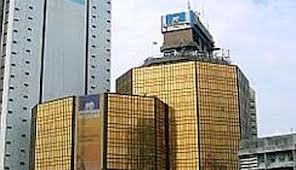Nigerian stocks tumbled, with the benchmark index (NGSEINDX) closing in a bear market, as the central bank intervened to defend the currency of Africa’s biggest oil producer and halt its slump to a record low against the dollar.
The Nigerian Stock Exchange All Share Index dropped 3.7 percent to 33,225.75 by the close in Lagos a 12th day of declines in the longest losing streak since January 2009. The gauge has tumbled 23 percent from this year’s high on July 9, the most among world equity measures tracked by Bloomberg. The naira surged, erasing a decline after Deputy Governor Sarah Alade said the central bank was selling dollars to the market.
Nigeria is facing lower export earnings after the average crude price among members of the Organization of Petroleum Exporting Countries dropped below $80 for the first time in four years. The weak naira is threatening Central Bank of Nigeria Governor Godwin Emefiele’s pledge to avoid raising interest rates before presidential elections next year.
“There is a risk to the investment of foreign portfolio investors by the fall in oil price. In order to preserve their capital, they’re dumping Nigerian stocks,” Sewa Wusu, an analyst at Sterling Capital Markets, said by phone from Lagos. “The ability of the central bank to keep up with the intervention will depend on the extent of pressure it gets.”
Banks to manufacturers and oil companies were among the 50 stocks declining on the main Nigerian gauge, while nine gained and 136 were unchanged. PZ Cussons Nigeria Plc (PZ)dropped 9.7 percent to 17.54 naira and Transnational Corp. of Nigeria Plc retreated the same amount to 3.08 naira.
Naira Gains
“We are seeing some panic selling from international institutional holders and that’s putting a lot of pressure on domestic equities,” Kato Mukuru, the Dubai-based head of equity research at Exotix Partners LLP, said by phone. “Long term I don’t have any doubts about the value proposition that Nigeria offers, but near term there is a lot of uncertainty about what happens to earnings and the currency.”
The naira ended a five-day slide after the central bank sold dollars on the market today, Alade said by phone from the capital, Abuja. It gained 2.5 percent to 165.70, the biggest advance since Feb. 28, after closing at a record low yesterday.
Nigeria’s benchmark interest rate has been held at a record high of 12 percent for three years. Emefiele said he planned to keep the rate unchanged until the February vote. The monetary policy committee is set to meet this month.
“We believe that the events over the past few days have raised the likelihood of the policy rate being hiked,” Ridle Markus and Dumisani Ngwenya, Johannesburg-based strategists at Barclays Africa Group Ltd., said in an e-mailed note today. “The likelihood of an emergency meeting next week, two weeks ahead of the scheduled meeting, cannot be excluded.”
Yields Rise
Nigeria’s $500 million of bonds due July 2023 fell, with yields increasing six basis points to 5.63 percent, the highest on a closing basis since Oct. 17.
The West African nation’s central bank is committed to currency stability and will continue defending the naira, Razia Khan, head of Africa macroeconomic research at Standard Chartered Plc in London, said in an e-mailed note, citing a conversation she had with Emefiele.
The central bank is also trying to avoid moving the naira peg for the first time since 2011. It offers naira at 155 per dollar, plus or minus 3 percent, at twice-weekly auctions. “There is no decision to devalue the currency,” Ibrahim Mu’azu, a spokesman for the central bank, said by phone today from Abuja.
“In the short term, the CBN will be able to manage the naira,” Lanre Buluro, head of research at Lagos-based Primera Africa Securities Ltd., said today in an e-mailed response to questions. “But sooner or later, the naira will have to be devalued.”














